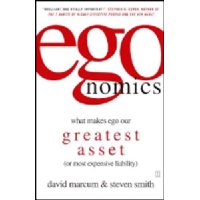| 商家名称 | 信用等级 | 购买信息 | 订购本书 |
 |
David Marcum: Egonomics (Ee) |  |
|
 |
David Marcum: Egonomics (Ee) |  |

Arrogant, self-centered, stubborn, and insecure -- words that most people associate with ego. But in this original, eye-opening work, authors David Marcum and Steven Smith argue that the upside of ego is as powerful as the downside and answer questions about ego that have been a mystery to most people.
In his landmark book, Good to Great, Jim Collins showed that one of two key traits defined leaders who transformed organizations from good to great: humility. But if humility is so powerful, why don't more of us have it? Why does ego allow us to reach good results but never great ones, unless balanced by humility? Why do we need ego to personally succeed, while having it often interferes with the success we pursue?
The Answers
Using five years of exhaustive research, Marcum and Smith provide compelling evidence and matter-of-fact answers on striking the balance between ego and humility to reach the next level of leadership. The authors include case studies to illustrate how ego subtly interferes with success but also how ego sparks the drive to achieve, the nerve to try something new, and the tenacity to conquer adversity.
The Early Warning Signs
We all have moments when ego costs us everything from an honest conversation to a job or promotion. Through cross-disciplinary research, egonomics reveals how to detect four early warning signs that ego is becoming a liability, including how:
• being too competitive makes you less competitive• defending ideas turns into defending yourself
• winning ideas can be halted by the creator's own intelligence and talent
• desiring respect and recognition can interfere with success
The Keys to Egonomic Health
Three key principles keep ego healthy:
• humility: striking the crucial balance between too much ego and not enough• curiosity: blending free thinking and discipline without bias
• veracity: removing fear of giving or getting feedback to produce water-cooler honesty
With a clear focus on elevating the way you do business, egonomics is a liberating approach to becoming a rare and respected leader. --This text refers to the Hardcover edition.
作者简介 David Marcum and Steven Smith travel the world teaching people to utilize the corporate asset of ego and limit its liabilities. With decades of experience and degrees in management and psychology, they¹ve worked with organizations including Microsoft, Accenture, the U.S. Air Force, General Electric, Disney, and State Farm. Their work has been published in eighteen languages in more than forty countries. --This text refers to the Paperback edition.
编辑推荐 From Publishers Weekly
In this flawed, uneasy mix of business analysis and psychological study, business consultants Marcum and Smith offer a defense of ego and its broadly misunderstood counterpart, humility, along with a discussion of how to maneuver ego to effectively encourage individual talent and sound business practice. Though the very word has negative connotations, the authors see ego as a vital asset to business growth. Employees who handle ego effectively are more confident, assertive and willing to listen to others and thus more equipped to compete and excel. Those who don't are forced to work from a place of defensiveness and an oversensitivity to outside judgment. Marcum and Smith effectively demonstrate the benefits of successful ego management in situations as varied as Fred Rogers's fight to keep government funding for PBS and Sojourner Truth's Ain't I a Woman speech, but their plans for ego management in the workplace are vague, confusingly organized and unspecific. The authors have backgrounds in business and psychology, but skim too swiftly over both to be satisfying on either level. Without firm strategy, this is a magazine article stretched to book length, neither informative nor particularly entertaining. (Sept.)
Copyright © Reed Business Information, a division of Reed Elsevier Inc. All rights reserved. --This text refers to the Hardcover edition.
Review
"Intelligent and wise...a beautiful job describing ego's strengths and pitfalls."
-- Dr. Amy C. Edmondson, Harvard Business School
"I loved this book. Reveals in depth and originality how to deploy this basic force for self-development and the common good."
-- Dr. Warren Bennis, distinguished professor of business, University of Southern California
"A wonderful book...addresses the greatest challenge faced by successful people."
-- Dr. Marshall Goldsmith, New York Times bestselling author of What Got You Here Won't Get You There
"Should be required reading in every MBA program."
-- Christine M. Pearson, Ph.D., Thunderbird School of Global Management
"Engaging and well-written."
-- Dave Ulrich, Ph.D., professor, Ross School of Business, University of Michigan
"This book is quite an accomplishment."
-- Jon Kabat-Zinn, professor of medicine emeritus, University of Massachusetts Medical School; author of Coming to Our Senses
"Refreshing...a compelling case for the practical importance of humility in the business realm."
-- Alan Deutschman, senior writer, Fast Company; author of Change or Die
"Pay attention when Stephen Covey calls a book 'brilliant and vitally important'... [Egonomics] reinforces the overwhelming presence of ego in business these days." -- Diane Brady, BusinessWeek Magazine --This text refers to the Hardcover edition.